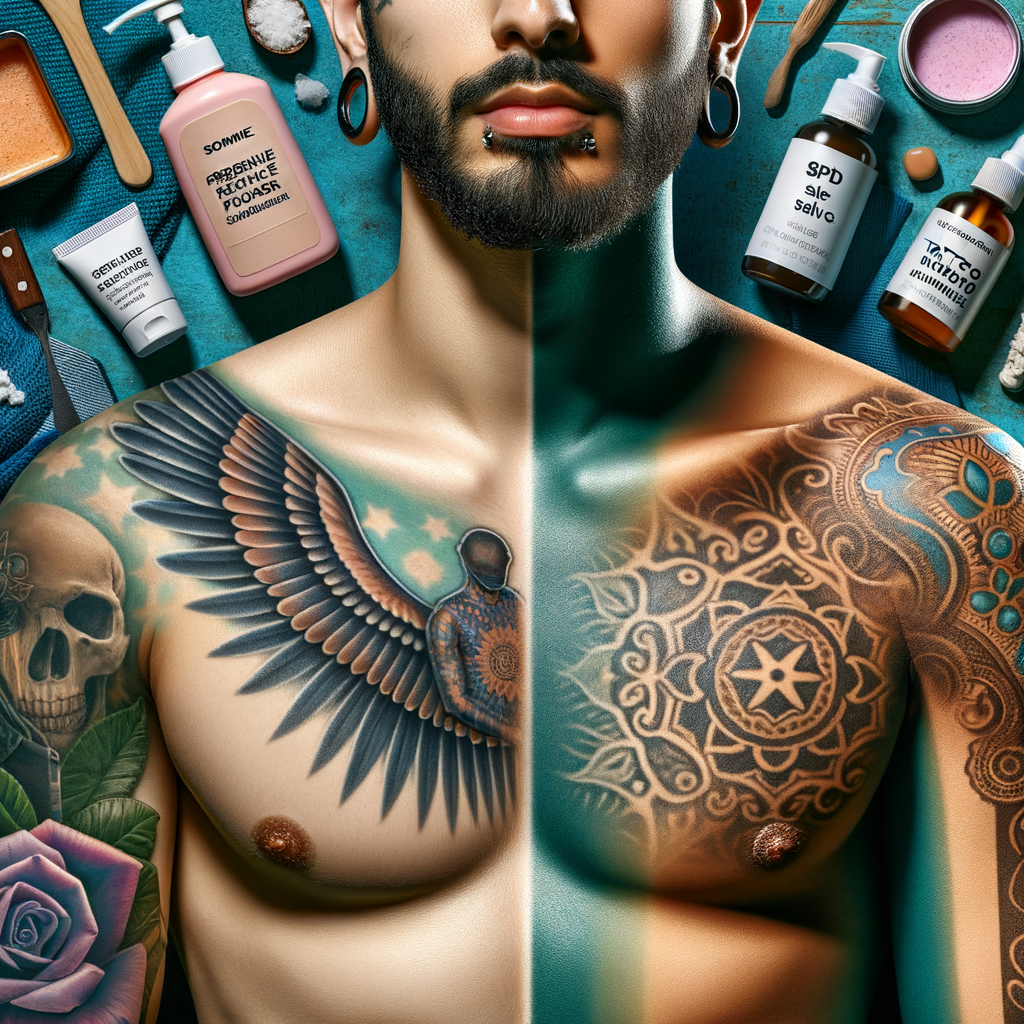
Introduction: The Art of Tattoo Longevity
When we decide to get a tattoo, it’s often a symbol of something important to us. It could be a memory, a belief, or a piece of art we admire. But have you ever wondered how long your tattoo will last? In this blog post, we will delve into the art of tattoo longevity. We will explore what influences the lifespan of a tattoo and how you can ensure your tattoo stays vibrant for as long as possible.
A tattoo is not just a drawing on the skin. It’s a form of body modification where a design is made by inserting ink, dyes, and pigments, either indelible or temporary, into the dermis layer of the skin. The lifespan of a tattoo depends on many factors, including the quality of the ink used, the skill of the tattoo artist, and how well you take care of it after getting inked. While some tattoos can fade over time, others can remain vibrant for decades.
There are several factors that can affect the longevity of your tattoo. These include:
-
- Quality of the ink: High-quality inks tend to last longer than cheaper alternatives.
- Skill of the artist: A skilled tattoo artist can create a design that lasts longer by ensuring the ink penetrates deep into the skin.
- Aftercare: How you care for your tattoo after getting it can significantly affect its lifespan. This includes keeping it clean and moisturized, and protecting it from sun exposure.
- Location on the body: Tattoos on parts of the body that are frequently exposed to the sun or undergo a lot of friction (like hands and feet) tend to fade faster.
Understanding these factors can help you make informed decisions about getting a tattoo and how to care for it afterwards. In the following sections, we will delve deeper into the lifespan of a tattoo, how to maintain it for longevity, and tips for tattoo touch-ups.
Part 1: The Lifespan of a Tattoo
When it comes to tattoos, one of the most common questions asked is, “How long will my tattoo last?” The lifespan of a tattoo can vary greatly and is influenced by several factors. Let’s delve into what determines the lifespan of a tattoo.
What Determines Tattoo Lifespan?
There are four main factors that can impact the lifespan of your tattoo. These include the quality of the ink used, the professionalism of the tattoo artist, the placement of the tattoo on your body, and your individual skin type.
- Quality of the ink used: The quality of the ink used in your tattoo can significantly affect its longevity. High-quality inks tend to last longer and fade less over time. On the other hand, low-quality inks may fade quickly and cause your tattoo to lose its vibrancy.
- Professionalism of the tattoo artist: A skilled and experienced tattoo artist knows how to apply the ink in a way that ensures it lasts. They understand the right depth to inject the ink and how to care for the tattoo afterwards. A less experienced artist may not have these skills, leading to a tattoo that fades more quickly.
- Placement of the tattoo on the body: Tattoos placed on areas of the body that are frequently exposed to the sun or that experience a lot of friction (like hands and feet) may fade faster. Tattoos in more protected areas tend to last longer.
- Individual’s skin type: Your skin type can also impact the longevity of your tattoo. For example, people with oily skin may find that their tattoos fade more quickly. On the other hand, those with dry skin may experience longer-lasting tattoos.
In conclusion, the lifespan of a tattoo is not set in stone. It depends on a variety of factors, some of which are within your control and others that are not. By understanding these factors, you can make informed decisions about your tattoo and how to care for it to ensure it lasts as long as possible.
Common Reasons for Tattoo Fading
While tattoos are designed to be permanent, they can fade over time. There are several factors that contribute to this fading. Let’s explore the most common reasons:
-
- Exposure to Sunlight
Just like how the sun’s rays can damage our skin, they can also cause tattoos to fade. The ultraviolet (UV) light breaks down the tattoo ink, causing the vibrant colors to dull over time. It’s like leaving a painting out in the sun – over time, the colors will start to look less vibrant. That’s why it’s important to protect your tattoos from the sun as much as possible.
-
- Ageing of the Skin
As we age, our skin changes. It loses its elasticity and becomes thinner. This can cause tattoos to fade and blur. The lines and colors that were once crisp and vibrant may start to look smudged and dull. It’s a natural part of the ageing process, but it’s something to be aware of when getting a tattoo.
-
- Improper Tattoo Aftercare
How you care for your tattoo after getting it can have a big impact on how well it holds up over time. If you don’t follow the proper aftercare instructions, your tattoo may not heal properly, which can lead to fading. This includes things like keeping the tattoo clean, avoiding scratching or picking at it, and applying the recommended ointments or creams.
Understanding these common reasons for tattoo fading can help you take steps to preserve the longevity of your tattoos. Remember, a tattoo is not just a piece of art, but a part of your body. It deserves the same care and attention you would give to any other part of your body.
Part 2: Maintaining Tattoos for Longevity
Keeping your tattoo vibrant and sharp for many years is not a matter of luck. It requires careful attention and consistent care. Let’s explore some essential tattoo aftercare tips that will help you maintain your tattoo’s longevity.
Essential Tattoo Aftercare Tips
After getting a tattoo, the way you care for it plays a significant role in how it will look in the future. Here are some key points to remember:
- Proper Cleaning and Moisturizing: After getting a tattoo, it’s important to keep the area clean and moisturized. Use a mild, fragrance-free soap to gently clean the tattooed area. Avoid scrubbing. After cleaning, apply a thin layer of fragrance-free moisturizer. This process helps to keep your skin healthy and your tattoo vibrant.
- Protection from the Sun: Sunlight can fade your tattoo over time. When going outside, make sure to cover your tattoo or use a high SPF sunscreen. Remember, the sun is the biggest enemy of your tattoo’s longevity.
- Avoidance of Certain Activities: For the first few weeks after getting a tattoo, avoid swimming in pools, hot tubs, or the ocean. The chemicals in the water can affect the healing process. Also, avoid activities that cause excessive sweating as it can lead to fading of the tattoo.
By following these aftercare tips, you can ensure that your tattoo remains vibrant and sharp for many years to come. Remember, a tattoo is not just a piece of art on your body; it’s a commitment that requires consistent care.
Long-Lasting Tattoos: The Role of Diet and Lifestyle
When it comes to maintaining the vibrancy and longevity of your tattoos, your diet and lifestyle play a significant role. Let’s delve into how hydration, smoking, alcohol, and a healthy diet can impact your tattoos.
-
- Importance of Hydration
Hydration is crucial for your skin’s health, and your skin is the canvas for your tattoos. Drinking plenty of water helps to keep your skin moisturized and supple, which can help your tattoos look their best. A well-hydrated body can also aid in the healing process post-tattooing, reducing the risk of scabbing and fading.
-
- Impact of Smoking and Alcohol
Smoking and excessive alcohol consumption can negatively affect your tattoos. Smoking can reduce blood flow to the skin, slowing the healing process and potentially leading to faded tattoos. Alcohol, on the other hand, can dehydrate your skin, making your tattoos appear dull and lifeless. It’s best to limit these habits to preserve the vibrancy of your tattoos.
-
- Role of a Healthy Diet
A healthy diet can contribute to the longevity of your tattoos. Foods rich in vitamins A and C can boost skin health, helping your tattoos to heal properly and maintain their color. Omega-3 fatty acids, found in foods like fish and nuts, can also promote skin health, making your tattoos look vibrant for longer.
In conclusion, your lifestyle choices can significantly impact the longevity and vibrancy of your tattoos. By staying hydrated, limiting smoking and alcohol, and maintaining a healthy diet, you can help your tattoos look their best for years to come.
Part 3: Tattoo Touch-Up Tips
In this section, we will explore the important aspect of tattoo touch-ups. This is a crucial step in maintaining the vibrancy and longevity of your tattoo.
When to Consider a Tattoo Touch-Up
Knowing when to consider a tattoo touch-up can be a bit tricky. However, there are certain signs that indicate it’s time for a touch-up. Let’s discuss these signs in detail.
-
- Signs of Tattoo Fading
Over time, your tattoo may start to lose its original color and vibrancy. This is a natural process due to the body’s immune system and exposure to sunlight. If you notice that your tattoo is looking dull or faded, it might be time for a touch-up.
-
- Changes in Tattoo Appearance
Changes in your tattoo’s appearance can also indicate the need for a touch-up. This could be due to weight gain or loss, aging, or skin conditions. If your tattoo has distorted or blurred lines, or if the design no longer looks sharp, a touch-up can help restore its original look.
Remember, a tattoo is a form of self-expression and a work of art on your body. It’s essential to maintain it well to keep it looking fresh and vibrant. If you notice any of these signs, don’t hesitate to consult with a professional tattoo artist for a touch-up.
How to Preserve Your Tattoo During a Touch-Up
Preserving the quality and vibrancy of your tattoo during a touch-up is crucial. It requires careful attention and adherence to two key steps. Let’s dive into these steps in detail:
- Choosing a Professional Tattoo Artist
Choosing a professional tattoo artist is the first and foremost step in preserving your tattoo during a touch-up. A professional tattoo artist has the necessary skills, experience, and knowledge to handle your tattoo with care and precision.
They understand the importance of maintaining the original design while enhancing its appearance. They also use high-quality inks that are less likely to fade over time. Remember, a good tattoo artist will not only touch-up your tattoo but also provide valuable advice on how to maintain it.
- Following Aftercare Instructions
Aftercare is just as important as the touch-up itself. Following the aftercare instructions provided by your tattoo artist can significantly extend the lifespan of your tattoo.
These instructions typically include cleaning the tattooed area with a mild, unscented soap, applying a thin layer of moisturizer, and avoiding sun exposure. It’s also recommended to avoid swimming and soaking the tattooed area in water for at least two weeks after the touch-up.
By following these steps, you can ensure that your tattoo remains vibrant and beautiful for years to come.
| Steps to Preserve Tattoo During Touch-Up | Why It’s Important |
|---|---|
| Choosing a Professional Tattoo Artist | A professional artist ensures the touch-up is done correctly and provides advice on maintaining the tattoo. |
| Following Aftercare Instructions | Proper aftercare extends the lifespan of the tattoo and maintains its vibrancy. |
Conclusion: The Journey to Tattoo Preservation
As we reach the end of our discussion on tattoo longevity, it’s clear that preserving the vibrancy and detail of your tattoo is a journey, not a one-time event. Let’s recap the essential steps and understand why regular maintenance is so crucial.
-
- Recap of tattoo care tips
Remember, the lifespan of your tattoo largely depends on how well you care for it. Here’s a quick recap of the key care tips we’ve discussed:
-
-
- Keep your tattoo clean and moisturized, especially during the healing process.
- Avoid direct sunlight on your tattoo. When you can’t avoid it, use a high-SPF sunscreen.
- Stay hydrated and maintain a healthy diet to nourish your skin from the inside.
- Don’t pick or scratch your tattoo, even if it itches during the healing process.
- Importance of regular tattoo maintenance
-
Regular maintenance is not just about keeping your tattoo looking fresh. It’s about preserving the art and the memories that your tattoo represents. By following the care tips and scheduling regular touch-ups, you’re not just maintaining your tattoo; you’re honoring the time, effort, and meaning that went into it.
Remember, a tattoo is more than just a design on your skin. It’s a piece of art, a story, a part of who you are. By taking the journey to tattoo preservation seriously, you’re ensuring that your tattoo continues to tell your story for years to come.














